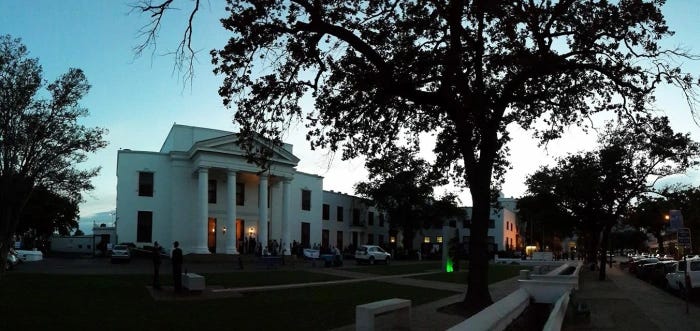The remarkableness of an unremarkable day
Early morning voting in Stellenbosch.
Yesterday millions of South Africans voted in the country's fifth democratic elections. I took an early-morning stroll to the Stellenbosch City Hall in anticipation that I would miss the crowds. Not so. Dozens of students, some having spent the night in the clubs across the street and some still in pyjamas, were already in line, waiting to cast what for most of them would have been their first vote. The atmosphere was solemn. Maybe some needed sleep, but there was a sense of expectation, of collective responsibility for a greater good.
Voting is not really a rational decision. The time it takes to vote – even if just half-an-hour – is more valuable (in monetary terms) than the benefit you receive by casting your vote, especially in a country with 25.3 million registered voters. To put it in perspective, your vote counts as much as the odds on a lotto ticket. And yet, many millions do it. Some even go to great lengths to vote: standing in line for hours, or driving to another province to cast their vote. Perhaps there are social costs to not voting: those with no blackened left thumb feel excluded from the office talk the morning after. But my sense is that, even if the result is a foregone conclusion, South Africans of all backgrounds have a strong sense of civic duty. Early results suggest that more than 72% of those registered to vote did, an impressive turn-out, even if it is lower than before.
This will not always be the case. Only a third of 18- and 19-year old's are registered to vote. The 'born frees' – which is perhaps a misnomer as those born into poverty in 1995 are little better off than those born in 1993 – are seemingly disinterested in voting. As we move into the third decade of democracy, the euphoria of the memories of 1994 will fade. It probably means that loyalty to the liberation movements of the past will give way to more critical reflection on who to vote for, that we are become a 'normal' democracy. This can only be a good thing.
Yet I also hope we do not lose our sense of uniqueness, our belief that South Africa, the rainbow nation, is somehow special. I hope we can instil and cultivate a moral obligation in younger generations to take up the baton, to share in the pride of voters who had fought so long for the right to do so. Ours is an unusual democracy, a democracy of paradoxes. We live in the most unequal country on earth, yet each of us, rich or poor, gets one vote. Crime continues to plague our people, yet no election since 1994 has been marred by violence; the worst report of violence I could find was of a guy shouting at officials for not being able to use his passport. Lest we forget, this is a remarkable achievement for a country that, only twenty years ago, was on the brink of civil war.
Today, around the country, people will be glued to their TV and computer screens. The results are updated every fifteen minutes on the IEC website. A more useful tool might be Adrian Frith's blog, where he will create a 2014 map at the voting district level*, similar to the one he created recently for the 2009 elections. But when the buzz of the results are over and everything returns to normal, let's take a moment to reflect on the remarkableness of what can best be described as an unremarkable day.
*11 May update: The map is now available here.
**Photo by Johan Fourie.


